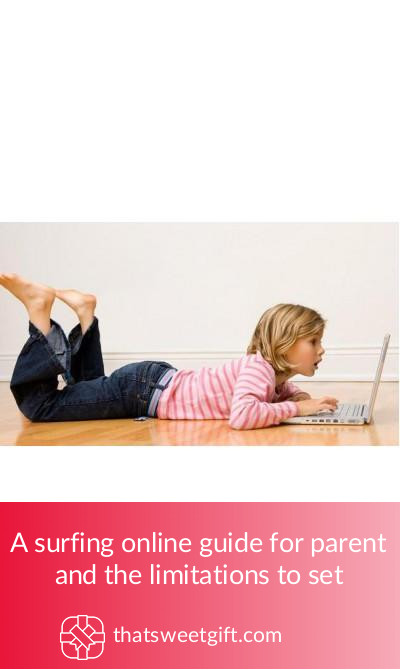A surfing online guide for parent and the limitations to set

As someone who lived from the age of cyber-babysitting, I understand the annoyance of a parent’s helicopter view over the shoulder while browsing the Internet. I hear the sighs, the grunts, and every long, drawn-out mommm when there was any sort of Internet spying going on. Now that I’ve graduated from the technology-nieve phase and can relate to the grown parent’s concern over what they’re kid is reading or participating in on the Internet, I can say there is value in finding a health guide to monitoring your child’s Internet use. The Internet is less like a virtual reality and more like a reality, where both bad and good exist in the same space. Internet predators, manipulative reading, violent computer games, and other inappropriate materials can make the Internet dangerous for a child. On the other hand, there is so much engagement, community, and learning to be had on the Internet of everything!
Be smart and set guidelines for both you and your child to adhere to about household Internet and Technology use. It’s difficult enough being a parent. There is constant worry about where your children are, who they’re with, and what they’re doing. This is because you care, and you’re trying your best to be an involved, responsible guardian. Remember, setting boundaries isn’t supposed to be sheltering. As you think through the suggestive guidelines below for child Internet surfing, consider the fact that the world is a big place, and there is a balancing act to be done if your child is to shape the world with their own hands and define limits for themselves.
Keep Communication Open
It’s important your child knows what the Internet of everything is and how it can be accessed! Imagine their eyes when you explain how much information, engagement, and community is on the computer-at the tips of their fingers in their very own home! Set expectations, explain the basic Internet safety, and make communication open and comfortable.
Set Guidelines

How much time do you want your child to spend on the Internet, and what limits can you set on online surfing? Considering a timer to assimilate the alarm as the time to plug out, and read a book! Create a balanced guideline for technology engagement, too. If they’re surfing on the Kindle, playing video games, or watching T.V., this time all counts toward their daily limit. Let your child pick and choose how they want to fit in their virtual self-care.
Read and Research
There are hundreds of parent control options and guidelines online to help hone in on your own household guidelines! Consider restricting the content your children can access and limiting the people they can communicate with online so you don’t have to eyeball them so closely when they’re casually (and most likely) engaging in some YouTube videos or scrolling through Instagram.
Share What You Know
The Internet and its participatory events and engaging platforms is no different than a sporting event or shopping plaza. Get on the Internet with your kids and experience what they like to do! This will allow you to have a better sense of what they’re doing and what sorts of things they’re viewing online, and it also shows your kids that you care, and you’re engaged, too!
Follow Through

Once you’ve set the rule, you need to stay consistent and maintain the status quo. If all technology is supposed to be off by 9pm, then turn off your own devices. Check in and follow up on rules. Don’t let too many rule breakers slip through without a talking to. As much as kids will fight you on the rules, don’t leave them much wiggle room. Be a good listened, but mostly importantly, be a good diplomat. Know when to be flexible, and when to be firm. The Internet can be a big and mysterious place, so consider monitoring their behaviors on the Internet by pulling up a chair or browsing server history.
Watch for Warning Signals
If your child seems disengaged at school, or is eager to get home to get on the computer, check in with your child. If your child is not willing to share information about what they’re doing online, check in with your child. It is easy to consider withdrawal and reluctance as “normal.” However, significant withdrawal might be fear or anxiety that your child is experiencing. Cyber-bullying and inappropriate images or games can have an effect on your child’s personality. Keep alert for any weird behaviors or actions that seem bizarre, and dial it back to the content their engaging in. This is no different than stepping into your child’s friend circles from time to time, and getting to know who they spend their time with and what they’re doing.
Pin for later

